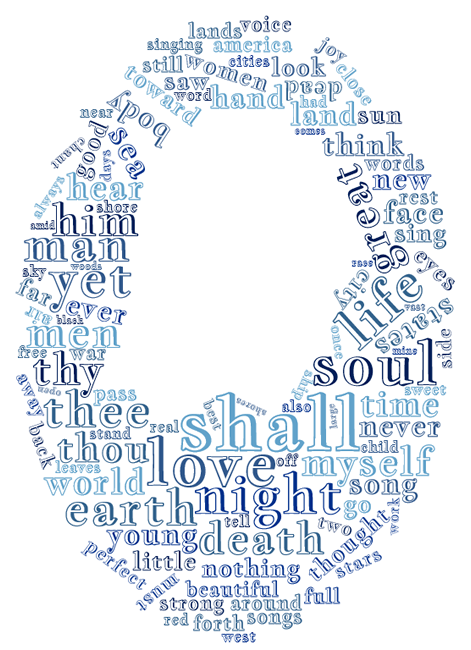 When approaching the poems of Walt Whitman (1819-1892), one will see that he is quite a modern poet to be listed among the greats. This is not to say that such work needs to be disregarded as being of less merit than John Donne or Percy Bysshe Shelly. On the contrary, in terms of his style and his subject matter there is a profound level of depth and feeling to be found from Walt Whitman’s work.
When approaching the poems of Walt Whitman (1819-1892), one will see that he is quite a modern poet to be listed among the greats. This is not to say that such work needs to be disregarded as being of less merit than John Donne or Percy Bysshe Shelly. On the contrary, in terms of his style and his subject matter there is a profound level of depth and feeling to be found from Walt Whitman’s work.
Naturalistic with Personification
From Facing West from California’s Shores to On the Beach at Night/ On the Beach at Night Alone one can see that there is a distinctive tie between Walt Whitman and his theology as well as with his natural surroundings. In Facing West from California’s Shores the reader quickly sees that America is given youthful personification. The country is looking about much like an awe struck child would do to his or her elders. There is an acknowledgment that a growth needs to take place, that there is a maturity that has not quite been embraced that sits with the older countries. This is but one example of Walt Whitman’s tie of nature to the personal.
In his poem I Saw in Louisiana a Live-Oak Growing Walt Whitman compares the old oak to himself. Furthermore, the solitary location of this specific oak baffles the writer as he states the human need. Where this oak has grown without the comfort and presence of the oak from which it came and there is no distinguished oak mentioned which is the pollinator or lover of this oak. Walt Whitman states that he needs to have that companionship. He has to be near to his lover, but not just to his lover but also to mankind and his kinsman. Personified here is not only the oak, but also the result of loneliness and solitude of the oak. Note the moss that grows and hangs down. There is a bond between this natural element and the non-physical. As with all great poetry, Walt Whitman transcends beyond just words and forces the reader to explore their own theologies and doctrines.
Forever the Lover
One of the most definitive characteristics of Walt Whitman’s poems is his strong and passionate language. There is a bluntness which is not common among other poets. Where there are those which address love and sexuality in a blunt manner, there are few which do so in a tasteful manner. Even in his poem O Hymen! O Hymenee! , he addresses the topic with taste and tact. Where this is not (in my opinion) a great example to the passion and sexuality that characterizes his poems, it does show that even with such a blunt topic there can be a tasteful and artful approach.
More in line with the passionate style of Walt Whitman would be his poem From Pent-Up Aching Rivers. The feelings and the manner in which the sexuality is addressed provokes the reader to have both an emotional response but also to have a mental remembrance should he or she have a lover. The poem is again a tie between nature and personification (as here one sees that sexuality is given a personality).
More than a Captain
Perhaps the most iconic poem from Walt Whitman would be O Captain! My Captain!. The poem is frequently quoted and revisions and variations have been made from it. Yet, this poem is not the typical poem language of the poet. It is true that there are the Oh’s which are found in his poems, but there the connections end. Where the majority of Walt Whitman’s poems are sensual and life embracing, this poem is life departing. Depending on how one approaches the poem, there is a tone of sensuality, but not to the point of making this work the definitive tangent from which one can compare his other works. This is not to diminish this work, but one needs to keep in mind the scope of his work generally encompasses different aspects.
Soul Seeker
Ongoing in his poems is a question. This question is to the divine, the mystic, and the “inner” man. In a few poems this is posted as the unfound item. In other poems the address is more to the unanswered. In his poem When I Heard The Learn’d Astronomer we can see that he refuses to discard the mystical and the divine (even in the face of so called logic).

Notice here that here he ties the logical pattern to the mystical and divine. He shows that yes there are patterns and such to the stars or heavens, but at the same time he shows that there is an aspect that will always baffle those which stand underneath their canopy.
Whether one is reading Walt Whitman for the first time or an avid reader, one is sure to find both emotional and intellectual gratification. For those which seek poems written to make us aware of the world around us, he has done so. Those which seek love and sexuality will find that he fully can satisfy such an appetite. Even those which seek death can find such in his poems. It may be true that Walt Whitman is considered more of a modern poet, but his poems are sure to span the remainder of mankind’s existence.


